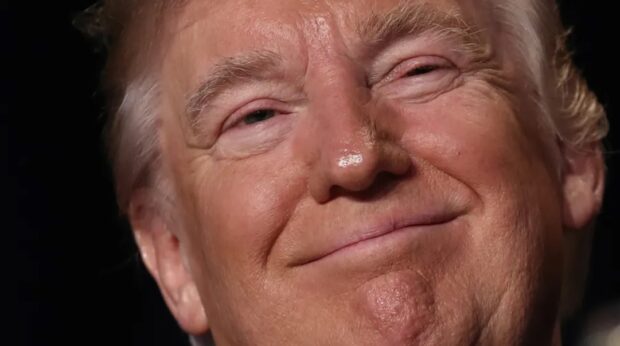
The good news for Donald Trump is that a New York appellate nixed the nearly half-billion dollar disgorgement judgment the Trump Organization owed for consistently defrauding financial institutions. The bad news is that the fractured court still agreed with the underlying judgment and his business operations are rightly enjoined. Trump’s camp is declaring total vindication even though, as opinions go, it’s a lot like being told you aren’t going to die, but they are going to have to remove a testicle.
The five justices — as a reminder for non-lawyer readers, New York’s lower courts are called “Supreme Court” and its judges are “justices,” I don’t make the rules — didn’t agree on much, but the crux of it is that Trump’s business empire is no longer on the hook for the roughly $350 million (just a shade under $500 million including interest) the trial court demanded. The appellate opinion struck down that award, ruling that it amounted to an unconstitutionally excessive fine as opposed to mere disgorgement of ill-gotten gains.
The court affirmed that Trump lied, cheated, and cooked the books to inflate his wealth, and it left intact the structural injunctions effectively barring his family from running a business in New York. But, pop the champagne, Donny! You “won.”
Or sparkling wine as the case may be… don’t want to have to cough up for that new tariff price for the genuine Champagne region.
Today’s posture reads like a procedure exam drafted by the cruelest law professor moments after learning their spouse has been secretly sleeping with the dean. All but one of the justices agreed that Attorney General Letitia James was well within her rights to bring this case. Justice Moulton, joined by Presiding Justice Renwick, upheld the finding of fraud and the injunctive relief, but struck the disgorgement as an Eighth Amendment “excessive fine.” Justice Higgitt, with Justice Rosado, thought the trial court made errors requiring a new trial. Then there’s Justice Friedman, who seems to reside in a fantasy world.
Without any path to a three-justice majority and desperately in need of getting this opinion out the door, Higgitt and Rosado conceded to join Moulton and Renwick in the decretal alone. Now the basketcase of an opinion can be appealed to the New York Court of Appeals (which is the actual NY “supreme court” where they are “judges,” just roll with it).

Free Attorney Time Tracking Template For Smarter Billing
Tired of messy time logs? This free attorney time tracking template helps you bill with confidence and accuracy. Learn more in the full article.
So why can’t New York collect on the disgorgement? A few reasons from Justice Peter Moulton’s opinion, which serves as the closest to a clear majority opinion in this matter (we’re going to omit citations in all these quotes for ease of reading):
However, the disgorgement order here departs from the traditional equitable limitations identified in Liu in two ways: first, it does not provide recompense to any victims, and second, it imposes joint and several liability. Accordingly, the instant disgorgement order constituted a fine.
One of the longstanding issues with this case — which Trump’s people have, inaccurately, claimed as fatal — is the lack of a victim who lost any money. At the risk of oversimplification, the theory of the case is that the Trump Organization routinely lied about value to secure favorable terms, financial institutions went along with this either because they were genuinely duped or didn’t care, and ultimately the bets paid off. The state’s argument is that it doesn’t matter if a bank called on a 3-7 offsuit and managed to hit a straight, it’s still fraudulent for a New York business to conduct business this way because, eventually, the cards aren’t going to fall and the state is going to end up holding the bag.
But can you actually have “disgorgement” when no one lost anything? The appellate court said no. Likewise, it’s hard to call it disgorgement when it’s joint and severable because how can an individual party be liable for returning assets they personally didn’t pocket? And if it’s a punitive fine, the Eighth Amendment requires it not be unduly excessive.
The opinion also questioned whether the award, even as a fine, accurately reflected the losses.
Additionally, a fine cannot be proportionate to the offense unless it is reasonably calculated to encompass only the actual proceeds that defendants realized from their fraud. To obtain disgorgement, the Attorney General bears the initial burden of establishing “a reasonable approximation of profits causally connected” to defendants’ violations. Where both legal and illegal conduct is implicated, the Attorney General “must distinguish between the legally and illegally derived profits.”
These assets were worth something, so the deals were likely going to happen on some terms. Assuming this opinion ends up carrying the day on appeal, the Trump Organization will end up coughing up some amount of money — as a fine — but nowhere near the current figure.
End of good news for Trump.
On the record before us, we find that Supreme Court properly exercised its discretion in awarding injunctive relief. Defendants persistently and intentionally inflated the asset values reported in their SFCs from 2014 to 2021, for numerous assets per each SFC. Despite the wrongfulness of their conduct, Supreme Court believed that defendants lacked remorse. Indeed, when asked at trial whether he still approved of McConney and Weisselberg’s work in preparing the SFCs, President Trump stated “[y]ou haven’t shown me anything that would change my mind.”
….
Additionally, the independent monitor noted in her most recent report to Supreme Court that, among other things, the Trump Organization lacked sufficient internal controls over financial reporting. Without adequate internal controls, Supreme Court reasoned that the Trump Organization “does not have the ability to . . . protect against fraud in the future.” Considering these factors, Supreme Court had ample bases to find that defendants would continue to engage in fraudulent and illegal activity.
It’s rarely a win when the opinion repeatedly cites your “fraudulent and illegal activity.” But then again, this is the guy who claims the Mueller Report was an exoneration, a claim specifically disproven by… the Mueller Report. Trump has never actually lost in his own mind, he just wins at varying levels of catastrophic.
While the two justices seeking a new trial were willing to drop their fight for the sake of moving the case along to a higher court, Justice Friedman wanted to give Trump the total victory he craved, by denying that the law as written even applies to the Trump Organization’s dealing with banks.
This action essentially turns section 63(12) on its head. The leniency with which the courts have construed the requirements for pleading and proving fraud under section 63(12) – a leniency that has been extended for the purpose of facilitating the use of the provision to prevent the exploitation of unsophisticated consumers, investors and small businesses – is here being used by Attorney General Letitia James to apply section 63(12) to a scenario to which that provision has never before been applied, or even thought to apply. Specifically, the Attorney General in this case has utilized the flexibility afforded her under section 63(12) to unwind complex financial transactions that were negotiated, face-to-face and at arm’s length, between a privately held real estate organization – that of defendant Donald J. Trump, the former president and current president – and ultra-sophisticated banks, insurance companies and government entities, which were advised by equally sophisticated lawyers, accountants, and other business professionals.
What happened to textualism? There’s nothing in 63(12) that magically limits it to “only if the victim is unsophisticated.” There are good policy reasons for the government to, generally speaking, not use taxpayer funds to vindicate rich businesses that could fight their own fraud battles. But the threat to the state isn’t necessarily that the Trump Organization took advantage of banks, it’s that an organization routinely pursuing fraudulent business practices screws the whole business environment. Friedman’s interpretation is the sort of deregulatory fan fiction that weaponizes complexity by removing any avenue to combat a fraud that isn’t obvious enough for Deutsche Bank to understand or care enough about to challenge. Fraud that happens to work out to the benefit of both sides can still be fraud and can still have external impacts on the market. Liquidity, pensions, insurance reserves… there are a lot of reasons why a state would authorize an Attorney General to step in there.
Nothing in 63(12) precludes such a case. It’s all just vibes Friedman reads into the plain text of the statute.
You’d think Trump would at least tacitly understand the argument that the government can pursue fraudulent real estate representations even if the lenders don’t care since that’s THE SAME LOGIC AS THE PROBE HE’S LODGED AGAINST LETITIA JAMES. That case seems, at this point, to be such garbage that his prosecutor is begging James not to force him to go to a trial, but it’s comical hypocrisy to act like this is an unheard of theory.
He also challenges the facts of the case:
…the one objective error of fact that the Attorney General has identified that was used as a basis for a valuation in the SFCs – the multiplication of the actual size of the Triplex by three – has not been shown by the Attorney General to have been anything other than an unintentional error…
If Justice Friedman is out there, I’m currently selling the Brooklyn Bridge and can get him a good deal!
Who amongst us hasn’t accidentally added 20,000 square feet to our paperwork? It’s just too easy to overlook something as trivial as… the size of a fucking car dealership when describing our homes.
These are just not serious people.
(Opinion on the next page…)
 Joe Patrice is a senior editor at Above the Law and co-host of Thinking Like A Lawyer. Feel free to email any tips, questions, or comments. Follow him on Twitter or Bluesky if you’re interested in law, politics, and a healthy dose of college sports news. Joe also serves as a Managing Director at RPN Executive Search.
Joe Patrice is a senior editor at Above the Law and co-host of Thinking Like A Lawyer. Feel free to email any tips, questions, or comments. Follow him on Twitter or Bluesky if you’re interested in law, politics, and a healthy dose of college sports news. Joe also serves as a Managing Director at RPN Executive Search.
